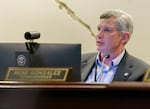
Portland City Commissioner Rene Gonzalez, shown here at a Portland City Council meeting on May 31, 2023, said he will no longer be asking commissioners next week to approve the three ballot items he initially proposed in tandem with City Commissioner Dan Ryan.
Kristyna Wentz-Graff / OPB
Portland’s new government will make it to its first birthday without a wholesale do-over.
Portland City Commissioner Rene Gonzalez is reversing course on a contentious plan to ask Portlanders to revise a voter-approved overhaul of the city’s form of government.
On Thursday, Gonzalez said he will no longer be asking commissioners next week to approve the three ballot items he initially proposed in tandem with City Commissioner Dan Ryan.
“City commissioners have a responsibility to reassess from time-to-time prior decisions that have long-term effects,” Gonzalez said in a statement Thursday. “After conferring with my colleagues, it has become clear there is a lack of support within City Hall.”
Gonzalez initially proposed placing three measures on the November ballot. He said he will still work to get one of those measures on a May ballot: a proposal to allow future Portland mayors to have veto power over council actions. But he will not move forward with the proposals to downsize the number of council members or change the city’s voting system.
This decision follows a Tuesday council session where Gonzalez and Ryan detailed these potential measures, and received critique from fellow council members. The measures would each need three votes from city council members to land on a ballot. It wasn’t certain that Gonzalez and Ryan would have a third vote after the Tuesday meeting.
“The work session on Tuesday brought much clarity,” said Ryan in a statement shared Thursday.
These three measures were pitched to address issues both Gonzalez and Ryan had raised with the changes to the city charter approved by voters last November. That ballot measure, Measure 26-228, laid out a plan to expand the City Council to 12 members, divide Portland into four political districts, and introduce a ranked choice voting system. The plan, which must be in place by the November 2024 election, also removes the mayor from having a seat on council. The mayor will only intervene to cast a tie-breaking vote.
Gonzalez and Ryan both shared concerns that this plan would be too costly and confusing for Portlanders to navigate. They said they had heard from members of the public who felt misled by last year’s ballot measure. That’s why the pair wanted council to advance a trio of measures to the November ballot to address some of these concerns.
“It gives everybody a chance to take a breath and look at the specific details,” Ryan told OPB last week. “They would have another chance to weigh in.”
The proposals would have reduced the number of council members to eight, alter the specific style of ranked choice voting and give the mayor veto power.
“My hope was to reduce cost and streamline [Measure 26-228′s] implementation,” Gonzalez said Thursday.
The commissioners faced a quick rebuke from Portlanders who voted in favor of the initial charter changes last year, dozens of whom rallied in front of City Hall before the Tuesday meeting. They also received pushback from city elections staff and a group of Portland-area state lawmakers.
Following the backlash, and news that it would cost the city $630,000 to hold a special election in November, Ryan and Gonzalez changed their tune.
On Thursday, Ryan said he is now focused solely on the mayoral veto proposal, and believes it should land on a May ballot. The city will not have to foot the bill for a May ballot, since it won’t be the only jurisdiction with an item on that ballot – which city elections staff said would have likely been the case for a November election.
Ryan said that allowing a mayoral veto in the new government system is a crucial accountability tool.
“I remain resolute in my belief,” he said Thursday.
Ryan also suggested that he wasn’t ever in total support of the ballot proposals first reported on last week.
“Commissioner Gonzalez and I talked briefly about areas we saw that could improve charter reform,” Ryan said, “Early thoughts drafted by staff were given to the press prior to me having further discussion.”
Gonzalez said Thursday he looks forward to continued conversations with council colleagues and the public before advancing a measure to allow for a mayoral veto in the spring.
